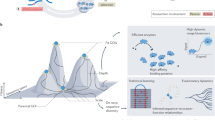Abstract
Directed evolution is a powerful strategy for gene mutagenesis, and has been used for protein engineering both in scientific research and in the biotechnology industry. The routine method for directed evolution was developed by Stemmer in 1994 (Stemmer, Proc Natl Acad Sci USA 91, 10747–10751, 1994; Stemmer, Nature 370, 389–391, 1994). Since then, various methods have been introduced, each of which has advantages and limitations depending upon the targeted genes and procedure. In this chapter, a novel alternative directed evolution method which combines mutagenesis PCR with dITP and fragmentation by endonuclease V is described. The kanamycin resistance gene is used as a reporter gene to verify the novel method for directed evolution. This method for directed evolution has been demonstrated to be efficient, reproducible, and easy to manipulate in practice.
Access this chapter
Tax calculation will be finalised at checkout
Purchases are for personal use only
Similar content being viewed by others
References
Stemmer WPC (1994) DNA shuffling by random fragmentation and reassembly: in vitro recombination for molecular evolution. Proc Natl Acad Sci USA 91:10747–10751
Stemmer WPC (1994) Rapid evolution of a protein in vitro by DNA shuffling. Nature 370:389–391
Tee KL, Wong TS (2013) Polishing the craft of genetic diversity creation in directed evolution. Biotechnol Adv 31:1707–1721
Yuan L, Kurek I, English J, Keenan R (2005) Laboratory directed protein involution. Microbiol Mol Biol Rev 69:373–392
Ruff AJ, Dennig A, Schwaneberg U (2013) To get what we aim for—progress in diversity generation methods. FEBS J 280:2961–2978
Joern JM, Meinhold P, Arnold FH (2002) Analysis of shuffled gene libraries. J Mol Biol 316:6443–6656
Dierick H, Stul M, De Kelver W, Marynen P, Cassiman J (1993) Incorporation of dITP or 7-deaza dGTP during PCR improves sequencing of the product. Nucleic Acids Res 21:4427–4428
Kuipers OP (1996) Random mutagenesis by using mixtures of dNTP and dITP. Methods Mol Biol 57:351–356
Spee JH, de Vos WM, Kuipers O (1993) Efficient random mutagenesis method with adjustable mutation frequency by use of PCR with dITP. Nucleic Acids Res 21:777–778
Zhao H, Giver L, Shao Z, Affholter JA, Arnold FH (1998) Molecular evolution by staggered extension process (StEP) in vitro recombination. Nat Biotechnol 16:258–261
Müller KM, Stebel SC, Knall S, Zip G, Bernauer HS, Arndt KM (2005) Nucleotide exchange and excision technology (NExT) DNA shuffling: A robust method for DNA fragmentation and directed evolution. Nucleic Acids Res 33, e117
Wong TS, Tee KL, Hauer B, Schwaneberg U (2004) Sequence saturation mutagenesis (SeSaM): a novel method for directed evolution. Nucleic Acids Res 32, e26
Engler C, Gruetzner R, Kandzia R, Marillonnet S (2009) Golden gate shuffling: a one-pot DNA shuffling method based on type IIs restriction enzymes. PLoS One 4, e5553
Rosic NN, Huang W, Johnston WA, DeVoss JJ, Gillam WMJ (2007) Extending the diversity of cytochrome P450 enzymes by DNA family shuffling. Gene 395:40–48
Cao W (2013) Endonuclease V: an unusual enzyme for repair of DNA deamination. Cell Mol Life Sci 70:3145–3156
Feng H, Klutz AM, Cao W (2005) Active site plasticity of endonuclease V from Salmonella typhimurium. Biochemistry 44:675–683
Miyazaki K (2002) Random DNA fragmentation with endonuclease V: application to DNA shuffling. Nucleic Acids Res 30, e139
Wang Z, Wang H-Y, Feng H (2013) A simple and reproducible method for directed evolution: combination of random mutation with dITP and DNA fragmentation with endonuclease V. Mol Biotechnol 53:49–54
Acknowledgments
This study was supported by the High Technology Research and Development Program of China (2006AA02Z221) and the National Natural Science Foundation of China (31171204) to H.F.
Author information
Authors and Affiliations
Corresponding author
Editor information
Editors and Affiliations
Rights and permissions
Copyright information
© 2017 Springer Science+Business Media New York
About this protocol
Cite this protocol
Feng, H., Wang, HY., Zhao, HY. (2017). Novel Random Mutagenesis Method for Directed Evolution. In: Reeves, A. (eds) In Vitro Mutagenesis. Methods in Molecular Biology, vol 1498. Humana Press, New York, NY. https://doi.org/10.1007/978-1-4939-6472-7_32
Download citation
DOI: https://doi.org/10.1007/978-1-4939-6472-7_32
Published:
Publisher Name: Humana Press, New York, NY
Print ISBN: 978-1-4939-6470-3
Online ISBN: 978-1-4939-6472-7
eBook Packages: Springer Protocols



